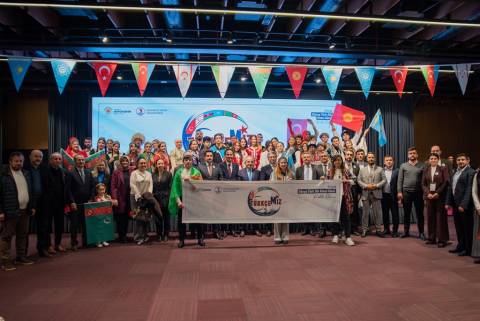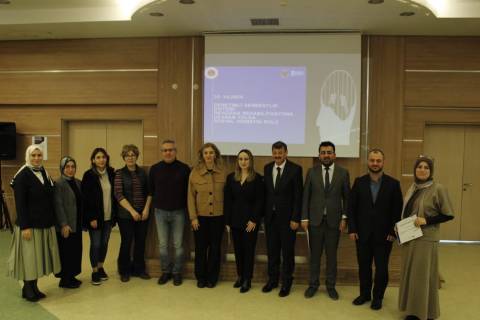29th Speaker of the Grand National Assembly of Türkiye, Şentop, Speaks at OMU Conference on "Constitutions and Politics in Türkiye"
The 29th Speaker of the Grand National Assembly of Türkiye, Prof. Dr. Mustafa Şentop, participated as a speaker at the "Constitutions and Politics in Türkiye" conference held at Ondokuz Mayıs University (OMU). Şentop emphasized that law is not just a field of expertise but a framework regulating all areas of life, even though most people often fail to recognize this.
Highlighting the role of rules in resolving disputes in places where multiple individuals coexist, Şentop underscored the importance of constitutions in the context of the state-law relationship.
Şentop: “May 14, 1950, is seen as the victory of politics, while May 27, 1960, is regarded by many political scientists as the bureaucracy's reprisal”
Referring to the statement, " Türkiye was placed among the defeated of World War II through the May 27, 1960 military coup," Şentop elaborated:
“Indeed, the constitution is drafted with this understanding. From 1950 to 1960, free elections were held, and the bureaucratic political elite, which had long governed Türkiye, could not win. The Republican People's Party (CHP) lost the free elections on May 14, 1950, not merely as a political party but as a structure that embodied the bureaucratic political elite of Türkiye. They lost again in 1954 and 1957. As another election approached, their chances of winning seemed slim. Consequently, discussions began on how a political view that could not come to power through elections might seize power without them. The most immediate solution that came to mind was a military coup. Preparations for such a coup began after the 1954 elections, with certain factions within the military taking action. Thus, while May 14, 1950, represents the victory of politics, May 27, 1960, is regarded by many political scientists as the bureaucracy's reprisal—a way to bring to power, without elections, a perspective that could not win through them.”
Pointing out that those unable to govern Türkiye through a one-party regime without elections sought alternative solutions, Şentop stated, “The approach was to devise a formula that would bring to power, even without winning elections, a mindset that could not win through the ballot box and ensure that even if they lost, they would remain in control. The Constitution was designed with this perspective, adopting an approach that greatly impacted and restricted the sphere of politics. Essentially, the notion was, ‘Even if we are not in power, others who come must govern as we would.’”
Şentop highlighted that, up until 2002, attempts by Türkiye to accelerate progress were often thwarted: “Politicians believed they alone governed the country after winning elections, forming governments, and assuming the role of prime minister. But that was not the case. Sometimes, others intervened, taking control at critical junctures and intersections. This dynamic, which became entrenched in Türkiye following the May 27, 1960 coup, marks the starting point of constitutional issues in the country.”
"Türkiye needs a constitution crafted by its people"
Emphasizing that Türkiye has the capacity to draft a new constitution, Şentop continued:
"Since 2002, the relationship between the constitution and politics in Türkiye has gradually changed. If we consider the constitution-politics balance as the distribution of a total power of 100, for instance, bureaucratic structures or oligarchies held 70 of this power, leaving only 30 to politics. When one of these actors expands its share of power, it naturally reduces the other's share. Previously, politics did not challenge such interventions from the 'figure on the right' much and accepted it as realpolitik. They thought, 'Perhaps we are unaware; these are our limits.' However, this dynamic changed after the movement led by Recep Tayyip Erdoğan came to power in 2002. They began to challenge the 'figure on the right,' asking, 'Why are you interfering, my friend? The people elected us, so stay out of it.' Gradually, this debate grew.
This inherently political conflict escalated to the point where the 'figure on the right' was removed. However, simply removing this figure was not enough, as the underlying mechanisms remained intact, allowing someone else to take their place. These mechanisms need to be dismantled to normalize governance. This effort represents a political struggle, a fight to uphold the mandate given by the people, and a confrontation with the bureaucratic oligarchy. While this fight continues, there is a need to address it through technical solutions and formal texts. Steps were gradually taken in this direction. Some changes were made in 2010. In 2011, drafting a new constitution became the first agenda item of the newly elected parliament. The Constitutional Reconciliation Commission was established, and significant progress was made. Approximately 50% of the new constitution was formulated with full consensus, but a final agreement could not be reached."
"The need for a new constitution persists in Türkiye"
Şentop highlighted that the mechanisms enabling coups in Turkey were revealed to still exist after the events of July 15, 2016, emphasizing:
"Türkiye needs a constitution crafted entirely by a parliament elected by the people. This is not merely symbolic, but even if perceived as such, it holds immense value. Until now, the constitutions in Türkiye were prepared by the coup leaders of May 27, 1960, and September 12, 1980. Yes, significant amendments have been made since, but ultimately, Türkiye needs a constitution made by its people.
The constitution of a New Türkiye—one that reflects today's reality and the vision for the future—must be drafted with the participation and leadership of those elected by the public. This need for a new constitution remains critical in Türkiye."
Rector Aydın: "Our President has made significant contributions to our country's legal system and constitutional development"
Rector Prof. Dr. Fatma Aydın stated, "I greet you with love and respect on behalf of Ondokuz Mayıs University. Today, it is a great honor for us to host one of our country's prominent legal and political figures, the 29th President of the Turkish Grand National Assembly, Prof. Dr. Mustafa Şentop, at our university. Mr. President, welcome to Samsun, where the torch of the national struggle was lit, and to Ondokuz Mayıs University. With his identity as both a lawyer and politician, as well as his academic expertise, he has made significant contributions to our country's legal system and constitutional development."
"I believe our students will gain new perspectives on the constitution, politics, and social life"
Highlighting that every constitutional effort throughout human history has been influenced by the cultural and political characteristics of its society, Rector Aydın remarked, "Today, we have the privilege of listening to the invaluable insights of Prof. Dr. Mustafa Şentop on the topic of 'Constitutions and Politics in Türkiye' and benefiting from his extensive experience in constitutional law and politics. During this conference, we will delve deeply into the critical junctures in Türkiye's constitutional history, the political culture of various periods, the evolution of political culture, the reasons behind the need for constitutions, and how these needs have shaped constitution-making processes. As a result, we will gain a clearer understanding of our responsibilities in this field and the contributions we need to make toward societal peace, justice, and democracy. In this regard, I believe our students will gain new perspectives on the constitution, politics, and social life through this event."
The conference saw the attendance of Samsun Governor Orhan Tavlı, 27th Term AK Party Yozgat MP Yusuf Başer, 26th Term AK Party Sivas MP Hilmi Bilgin, 26th Term AK Party Bursa MP İsmail Aydın, Samsun Metropolitan Municipality Mayor Halit Doğan, Samsun Chief Public Prosecutor Mehmet Sabri Kılıç, Bolu Abant İzzet Baysal University Rector Prof. Dr. Mustafa Alişarlı, OMU Vice Rectors Prof. Dr. Alper Kesten, Prof. Dr. Ayşe Pınar Sumer, Prof. Dr. Çetin Kurnaz, OMU Secretary-General Assoc. Prof. Dr. Erhan Burak Pancar, Head of the Union of Legal Scholars Foundation Attorney Yaşar Baş, provincial protocol members, academic and administrative staff, and students.
A memorable conclusion with a symbolic gesture
The program concluded with OMU Rector Prof. Dr. Fatma Aydın presenting Prof. Dr. Mustafa Şentop with a tree certificate as a token of appreciation, followed by a commemorative group photo.



















